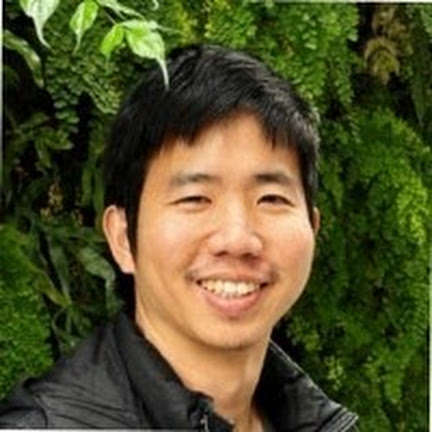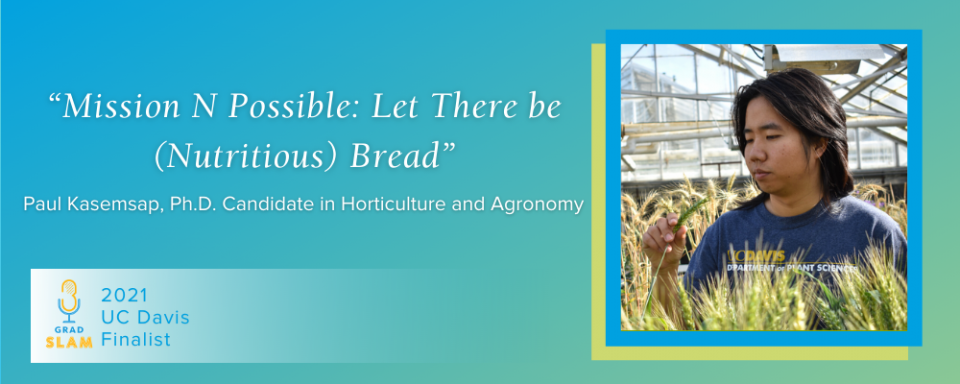Paul Kasemsap
พรพิพัฒน์ เกษมทรัพย์

~growing plants for improved wellbeing
Meet Paul Kasemsap, Horticulture & Agronomy Graduate Student and Grad Slam Finalist
This is an excerpt from an article first published by UC Davis Graduate Studies in March 2021.

Name
Paul Kasemsap (he/him)
Program, Degree & Year of Study
Horticulture & Agronomy, Ph.D., 6th year
Research Interest
Plant Physiology (i.e. how plants turn sunlight, air, water, and dirt into food)
Previous Degrees and Colleges
B.S. in Agricultural Sciences from Kasetsart University, Thailand
M.S. in Plant Sciences from Wageningen University, Netherlands
Title of Grad Slam Presentation
Mission N Possible: Let There Be (Nutritious) Bread
Describe your presentation style in three words
Show, don’t tell!
What did you do to prepare for Grad Slam?
I love talking about my research with friends and family, and then asking for feedback. This really helps me get better at being a friendly, neighborhood, science storyteller.
If you are a returning Grad Slammer, what made you want to compete again?
We have learned from history, especially in the past year, how important science is in helping us navigate through global crises. As a scientist, I aspire to be a better communicator. Grad Slam is a fun opportunity that helps bring my ‘plantastic’ research to a wider audience. I can’t wait to share my revised talk, highlighting the need of everyone working together to mitigate climate change and ensure global food security. Thank you all for supporting sciences!
What initially attracted you to your field of study?
The Secret Life of Plants! They can’t talk to us directly, so this inspires me to pay attention to how they’re responding to environmental factors, like light, water, or temperature. Plus, many of them are edible and visually pleasing! Who wouldn’t love plants!
Grad Slam is about presenting complex ideas for a general audience. Why would people want to learn more about your research?
My “Mission N Possible” explores how we can make wheat–a staple crop supplying a significant amount of protein and calories in human diet worldwide (those bread, pizza, noodle, pasta and more… that we’ve been enjoying)–resilient to changes in the climate system. Rising carbon dioxide (CO2) levels, as a result of human activities, prevent plants from turning soil nitrogen into protein, essentially threatening our global food and nutritional security. Across the globe, away from my home country, I am grateful for access to higher education, which has granted me opportunities to learn how food is being produced in different regions around the world. This mission at UC Davis, should we accomplish it, will answer fundamental questions on how plants make food and help sustain nutritional qualities of our major food sources in response to climate conditions anticipated in the near future.
What do you like to do in your free time?
I enjoy being outside in the sun. You will likely find me gardening, hiking, rafting, or just chilling out on grass.
Do you have any mentors who helped you develop your interest and strength in research communication? If so, how did they help you? I owe my passion for science communication to all my teachers and mentors. Particularly, I am grateful to have been working with Dr. Arnold J. Bloom, my Ph.D. advisor. Having served as a teaching assistant in Dr. Bloom’s course SAS 25 Global Climate Change at UC Davis, I was able to develop my communication skills with students from diverse backgrounds. I’d also like to acknowledge Mrs. Malin Sakdiyakorn, my elementary biology teacher, who encouraged me at the age of nine to give my first-ever official science presentation about my pet betta fish, in front of a classroom full of third-grade kids. This tiny empowerment has a life-long impact.
Where do you see yourself in 10 years?
I see myself standing outside among plants in the field (my “playground”), working with other passionate individuals, still trying to learn more about these fantastic green organisms. Understanding their secret life will help us identify and implement best practices in feeding this hungry planet.
Global Education for All Recipient
“Paul Kasemsap not only engages a critical global challenge—United Nations Sustainable Development Goal 2: Zero Hunger—but also reminds us of the human side of food and why research on sustainable practices is critical. ” - Global Affairs Selection Committee Members
Paul’s presentation has received the Global Affairs’ Global Education for All designation. This means the majority of selection committee members have agreed that the recipient’s project: (1) helps accomplish at least one of Global Affairs’ global learning goals, and/or (2) clearly addresses at least one UN Sustainable Development Goal while grappling with the complexity of doing so. The “Global Education for All” prize recognizes a Grad Slam submission that illustrates how a graduate student embraces global learning. Global learning at UC Davis is a combination of local, regional, national, and international experiences through which the student develops key skills, knowledge, and networks that help them build global awareness, engage global diversity and pursue collaborative and equitable global action. The finalists will have the opportunity to have their video showcased at the Global Learning Conference hosted by the Global Learning Hub in Global Affairs in April of this year. Learn more about this designation.
category:news tag:
science plant food Read more thoughts:
-
Genome-wide Association Study of Rice Vegetative Growth under Ammonium or Nitrate Nutrition (31 Jul 2025)
-
The inaugural Bay Area Plant Hub Symposium 2025 (17 Apr 2025)
-
How can we cultivate an innovative plant science community? (16 Apr 2025)
-
[Dataset] Vegetative biomass production under different inorganic nitrogen forms of the USDA rice (Oryza sativa L.) diversity panel 1 (17 Mar 2025)
-
Mission N-Possible: Influence of Inorganic Nitrogen Forms on Small Grain Crop Carbon Assimilation (13 Sep 2024)
-
Genome-wide Association Study of Rice Vegetative Biomass under Different Inorganic Nitrogen Forms: Ammonium or Nitrate (13 Aug 2024)
-
Genetic adaptation to ammonium sustains wheat grain quality and alleviates acclimation to CO2 enrichment (23 Nov 2023)
-
Sharing research data (25 Jan 2023)
-
Breeding for Higher Yields of Wheat and Rice through Modifying Nitrogen Metabolism (23 Dec 2022)
-
Giving credit where it's due (18 Nov 2022)
-
Lessons beyond classroom: 12 opportunities to grow a better self while in college (10 Aug 2022)
-
Everything, Everywhere, All at Once (01 Aug 2022)
-
UC Davis Plant Sciences Symposium 2022 Award Winners Announced - Paul gave the best student talk! (27 Jun 2022)
-
I was told that: It's what you do that defines you. Is it? (20 May 2022)
-
I was told that: Opportunity is like a bus (20 May 2022)
-
Can we use personalized ads to improve our decision? (12 May 2022)
-
If you could choose better, would you? (12 May 2022)
-
How pottery helps me write (10 May 2022)
-
We need more conflicts (08 May 2022)
-
Rate My Lab! - A yelp-like platform to grade your advisor? (01 May 2022)
-
Life outside the lab - exploring passion projects beyond research (27 Apr 2022)
-
Thought of the week: Trash hunt squad? (22 Apr 2022)
-
Never have I ever… coded (and wondered into the world of data science) (18 Feb 2022)
-
Where do we get protein in our daily diets? (01 Jun 2021)
-
ภาษาไทย (15 May 2021)
-
Hello World (13 May 2021)
-
Find a talk - What if we can find all the talks in the world? (09 May 2021)
-
Meet Public Scholarship and Engagement Prize Winner: Paul Kasemsap (19 Apr 2021)
-
Meet the Fulbrighters Series: Pure & Applied Science - Paul joined a panel sharing Fulbright experience in the USA (30 Mar 2021)
-
Meet Paul Kasemsap, Horticulture & Agronomy Graduate Student and Grad Slam Finalist (19 Mar 2021)
-
ชีวิตติดโชค (01 Nov 2020)
-
ไนโตรเจน...ธาตุอาหารพืชเปลี่ยนโลก (05 Aug 2020)
-
Grad Innovator Fellowship 2020: Meeting Global Protein Demands and Optimizing Resources in the Face of Climate Change (01 Apr 2020)
-
Rising atmospheric CO2 concentration inhibits nitrate assimilation in shoots but enhances it in roots of C3 plants (23 Oct 2019)
-
UC Davis Plant Breeding Center Graduate Student Spotlight (01 Jun 2018)
-
“ไบเออร์” สร้างยุวชนเกษตร รับมือปัญหาความมั่นคงทางอาหาร (15 Nov 2017)
-
2 ยุวชน..หัวใจเกษตร กับเวทีสำคัญ..ภารกิจช่วยโลก!! (12 Nov 2017)
-
การประชุมสุดยอดยุวชนเกษตร (Youth Ag-Summit) ปี พ.ศ. 2560 (27 Oct 2017)
-
Characterisation of Arabidopsis thaliana candidate genes putatively involved in the response to salt stress (08 Jul 2015)
-
First day of class in Wageningen (21 Jun 2015)
-
A year in Wageningen UR (19 Jun 2015)
-
Fietsen are sustainable! (18 Jun 2015)
-
Changes in photosynthetic and other yield components contributing to yield improvement of Dutch tomato (01 Jun 2015)
-
การเดินทางจากสนามบิน Schiphol สู่ Wageningen (12 Aug 2013)
-
The appropriate supporting material for micropropagated Vanilla planifolia Jacks. ex Andrews plantlet (08 May 2013)
-
Effect of Drought Stress on Chlorophyll Fluorescence and Net CO2 Exchange Rate of Vanilla planifolia Jacks. ex Andrews (25 Mar 2013)